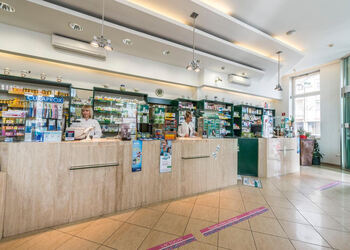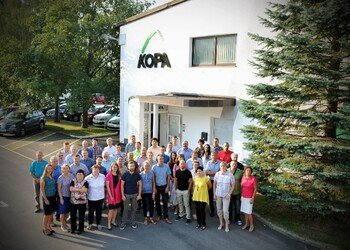Why is the online store malinca.si so successful?


Learn what Nastja Kramer thinks about entrepreneurship, motivation, and key business processes.
Tracking time and attendance is the key cutting down on admin
In Spica’s first podcast, we hosted Nastja Kramer, founder of the Malinca brand – a web portal and online store for healthy foods and natural cosmetics. The products they sell mostly feature products of Slovene origin and products sourced from controlled organic production. The company was established in 2013 by Nastja Kramer and Andreja Stopar. Today, the company has nine employees. Malinca is a four-time recipient of the “Online Trader of the Year” award in the foods and beverages category. In 2015, the company won the “Online Trader of the Year – Overall” award. In addition to this, they also received the WEBSI award, the national “CERTIFIED SHOP®” trust mark and the European trust mark.
Read on to learn what Nastja Kramer thinks about entrepreneurship, motivation and key business processes.
What is the main driver of Malinca’s success?
I think it is the fact that Andreja and I truly believe in our idea and we enjoy what we do. If you enjoy what you do, it's easier to keep going when the going gets tough. In my opinion, the fact that we enjoy what we do was the main reason we started reaping the fruits of our success in just five years’ time. It is also why the company is so successful today.
The second driver of our success was that Andreja and I really put ourselves out there. People know who is behind the products, we show them how they can use the products and we bring our stories and product closer to them. Then, everything becomes easier. I think this personal approach is one of the key factors of our success.
Why was the COVID-19 crisis a good thing for Malinca?
As lockdown first started, I became slightly anxious because I did not know how things would turn out in the end. But then we drew up a strategic plan and decided to provide our customers with useful content, such as recipes, healthy nutrition advice and workout recommendations. We also launched our radio advertising campaign. In the end, it all worked out perfectly and our sales skyrocketed. During lockdown, the entire staff had to give it 150 percent. Otherwise, we would never have been able to process all the orders. The COVID-19 crisis brought us even closer to one another. In times when many people stayed at home or even lost their jobs, we upped our game 150 percent. People wanted fast food delivery to their homes and we provided it. The results of our dedication during lockdown are still tangible today, and satisfied customers keep returning.
How do you motivate employees at Malinca?
One major factor is that we are honest with one another and very connected; not just when it comes to work, but also as friends. We are kind of like a family business. Trust, interconnectedness and a good team are essential ingredients for success. Good products alone are no guarantee that a company will grow. Also, there is no hierarchy at Malinca. We are all equal. We motivate our employees financially and through team-building exercises at weekends, which current business results allow us to hold every three months. It is important that everyone is au fait with our goals and our vision. This way, employees feel that they are an integral part of the team.
What motivates you each morning to put on a smile and go to work?
I am motivated to go to work because I feel good there. And I get to do what I like. I admit that I did not always come to work with a smile on my face. There have also been some very testing times. But that’s all in the rear-view mirror now. The first thing I do when I wake up is to go through my list of things that I hold really dear. Also on that list is a statement that I am working with the best team in the world. This is what keeps me going and motivates me to go to work.
How do you cope with appearing in the media?
In terms of brand positioning, personal exposure and the story are very important. Co-owner Andreja and I made the decision that I would be the one to deal with media exposure. It was difficult in the beginning because I was not used to being in front of the camera and appearing in the media. But once you realize that people are truly interested in what you do and they love seeing you, its plain sailing. I cannot say I love the fact that many people now recognize me, but it is part of the job and I like it.
Why are time and attendance tracking important business tools at Malinca?
Despite employees being close-knit, our company still has to have a system for tracking overtime, working hours, holiday leave and sick leave. We used to do this by using an Excel spreadsheet, where we entered all the data. At the end of the month, this data had to be processed for accounting and evaluated. Often it happened that someone forgot to enter the data or that the data got deleted all by itself. Everyone had to enter their own data, so things were always a bit loose. This year, when we were moving to our new premises, we decided to implement a system that is simple to use, transparent and easy on the accounting. While browsing the web for solutions, I stumbled upon AllHours, and this was how our cooperation first began.
Why did you opt for All Hours?
I like it because it provides so many features in one single place: an overview of all the hours, an overview of the absences, and it allows you to track your time when working from home, which happens frequently at Malinca. This way, traveling expenses can be calculated correctly. You can also request holiday leave without having to send an email. Besides everything being available in one place, All Hours is also very user-friendly – when you arrive, you click on the button, and then you leave, you click on another. That’s it. No unnecessary extra features that nobody uses. It is simple to use for all employees, and this is what counts. Even the price is affordable. The implementation was also quite easy. The Spica team was of immense help to us. We were able to have things up and running pretty fast, and we started using the application.
How does time keeping on smartphones differ from time keeping in the desktop interface?
I believe most of my coworkers use the smartphone application. We also have a card terminal that employees can use to clock in. Andreja does the payroll calculations and she uses the desktop version of AllHours, which she can also use to manually adjust the hours whenever someone forgets to clock in or clock out.
You can keep attendance, absence and holiday leave… but what about payroll data?
Of course, this is one of the key features. Andreja no longer has to calculate the hours, keep track of days and calculate traveling expenses manually. She used to spend considerably more time on this. Since we have started using AllHours, she simply reviews the data. What is more, she can access all the information in one single place. I think we saved quite a lot of her time with this solution.
Did the implementation of All Hours also affect other processes within the company?
No, we did not change any other processes. For us, an automated time-keeping method was essential since we did not have one before. Transparency and accuracy – this is the novelty. And things really work great.
Were there any second thoughts before the implementation of the All Hours system?
My second thought was if we will remember that we have implemented time and attendance tracking. We were not used to using such a system. I thought we would keep forgetting to clock in and clock out. That did happen during the first month. So we hung “All Hours” signs all over the company’s premises to remind us to track our time. It took us two weeks to get accustomed to the new system. It’s still possible to forget to clock out sometimes, but other than that, the system works a treat.
Does a time and attendance system on smartphones make it easier to track work while on the move?
Yes. I spend a lot of time on the move and I can confirm that time and attendance tracking on smartphones comes in very handy. We used to keep Excel spreadsheets on the computer to track our work, but staff would quickly forget where they had been and why. Now, I can do all of it on my phone without the need for any additional tools.
What was the feedback of your employees when you implemented All Hours?
Before we actually made the decision to implement the system we discussed it with my team. Everyone agreed that we had to implement a more modern system since keeping an Excel spreadsheet was really “uncool”. Now, everyone is thrilled. In fact, you do not even realize that you are clocking in because you both clock in and clock out automatically. It is a truly non-invasive method of tracking time.
A system, which does not demand effort, is highly welcome.
What about remote work and trusting your employees?
I have no trust issues within my team since we work together perfectly. What is more, we also have a new system which keeps track of the completed tasks. I never once doubted anyone or thought that anyone was cheating. However, this all depends on the relationships within a company.
How did your cooperation with Spica go?
Their team was great help in assisting us implement the system. There was a sizeable amount of work involved in installing the application. Their support was the main reason we never threw in the towel. As soon as the system was up and running on all devices, everything ran smoothly. With these kinds of project, I think the most important thing is for the provider to ensure the initial support, set things up and make sure they are functioning properly. Now, if we have any questions, we simply write them an email and they are always quick to respond. But generally, like I said – the less effort that a system demands, the better it is. We actually have zero problems now and no longer need any additional support.
What about Malinca and the future? Are you planning on optimizing your business processes?
We are constantly exploring new avenues for optimizing our processes and are actively working on making it happen. We want to cut down on our admin so we can dedicate our time to what really matters, for instance product development and communication with our customers. This is why we want to optimize most of our processes in the future.
What we have learned from our experience is that we should not make long-term plans. We are currently drawing up our plan for 2021. We would like to move into foreign markets and secure the company’s growth.
Slow and steady wins the race. We wish Malinca the very best going forward and every success with their business plan for 2021!



